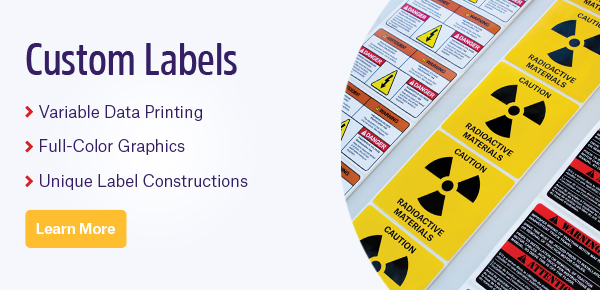 Thermal printers are often employed in a variety of industries, from automotive and aeWe’ve previously covered the benefits of RFID, particularly the ability to scan multiple tags simultaneously without a direct line-of-sight, rewritable chips, and added security features. It’s a technology that’s been around since the 70s, and it’s helped revolutionize a number of different industries, from the automotive sector to aerospace, construction, and oil & gas. When it comes to the latter, it’s provided a boost through the industry, especially regarding safety and logistics.
Thermal printers are often employed in a variety of industries, from automotive and aeWe’ve previously covered the benefits of RFID, particularly the ability to scan multiple tags simultaneously without a direct line-of-sight, rewritable chips, and added security features. It’s a technology that’s been around since the 70s, and it’s helped revolutionize a number of different industries, from the automotive sector to aerospace, construction, and oil & gas. When it comes to the latter, it’s provided a boost through the industry, especially regarding safety and logistics.
Safety
Safety is a high priority for the oil and gas industry, where an emergency can occur at any time and often without warning. Many drill sites and refineries are staffed with thousands of personnel, often in remote areas, and accounting for everyone during a crisis can be a logistics nightmare. With an RFID-based tracking system, personnel can wear badges or tags with RFID chips encoding pertinent information for every individual, including their name, position, and even their training certifications. In the event of an emergency, they can be accounted for quickly as they exit the site while also verifying the entry of staff responsible for dealing with the crisis.
On a day-to-day basis, this type of system can be used to replace timecards and log sheets. Timecards are generally inefficient, with lines of workers waiting to punch in or out, and employees regularly forgetting to punch their cards, making it harder for accounting to get things right. Instead, RFID systems that immediately scan badges as every individual enters the drill site or refinery can be employed. Loaded with their certifications, this ensures that the right people are on site, visitors are identified, and the total number of personnel is counted in real-time.
Logistics
Managing equipment and tool usage, both owned and rented, in addition to product shipments and storage, is a massive job. Coordinating the flow of so many items requires a flexible, efficient system of tracking that follows each item as it’s processed and paid for. To avoid loss of valuable equipment, the following information needs to be recorded for each item:
- Current location
- If in use, the identity of the personnel in possession of it
- Date of maintenance
- Date purchased or rented
- Date required for return, if necessary
All of this can be monitored via RFID tags or scanned labels as the equipment is signed in and out. An RFID system can also prevent the theft of equipment and tools as it tracks the real-time flow of usage, from on-site locations to storage in warehouses.
When it comes to product shipment, RFID helps track multiple barrels and other containers simultaneously as they’re loaded and shipped. This is especially useful for large shipments; instead of scanning individual barrels, which often weigh a lot and are difficult to move around, one needs only to perform a single scan from a distance, accounting for every item instantaneously.
One of the best features of RFID is its adaptability since companies like IndustriTAG can now insert RFID inlays in nearly any type of label. Containers for shipment and storage often require specialized labels that resist chemicals, including thick oils, as well as harsh weather conditions. Only recently has it been possible to provide this type of durable chemical-resistant RFID label. This further provides the benefits of 2 different types of tracking systems since the RFID labels can also be printed with barcodes on their facestock. Using a thermal-transfer RFID printer, you can develop a system that takes advantage of RFID technology’s best features and combines it with a secondary tracking system that includes thermal-transfer printed barcodes, which yield optimal resistance against harsh conditions.
Specialized applications of RFID
Over time, oil pipelines can corrode due to the high acidity of crude oil & gas, reducing the pipe’s integrity and potentially leading to hazardous leaks. Monitoring pipeline integrity is no easy feat, as pipes need to be shut down prior to manual inspection. Because of how much labor is involved, this process only occurs once every few years. To manage this, at least one major company, BP, has installed an RFID-based network of sensors to the exterior of pipes that can continually monitor pipe thickness in real time. This doesn’t just save money by reducing the need to shut the pipes down for inspection, but it also helps gather a lot more data that can then be used to develop better pipelines in the future.
Furthermore, companies often rely on reamers for drilling operations; these tools are designed to bore holes through the earth at high speeds. These reamers depend on dropping a steel ball down a pipe until it shears a pin preset. However, conventional reamers offer limited control of this process, and resetting the tool can be time-consuming and costly. One company, Weatherford (based in Switzerland), has designed a reamer that uses RFID to active and deactivate the device during downhole operations. Ultimately, this makes the tool more time-efficient and provides better borehole quality as well.
RFID can provide a boost to many facets of the oil & gas industry, from safety and logistics to pipeline and downhole applications. Though RFID has been around since the 70s, it’s only now that it seems to have found a home in this sector, and with newer ways of utilizing RFID—including the addition of inlays on any type of label or tag—it’s only set to become more prominent, helping increase the productivity and cost-effectiveness of operations around the world.

